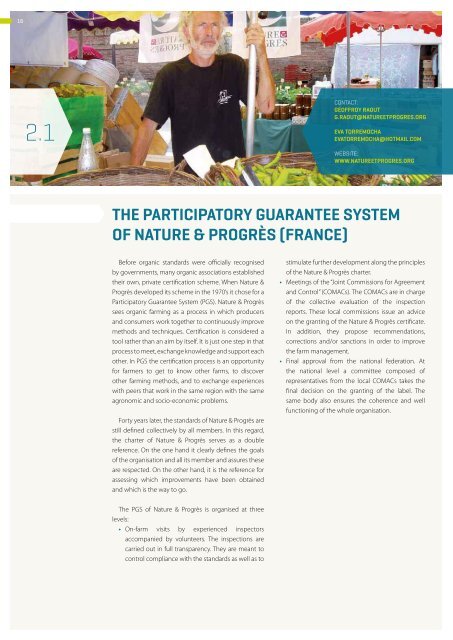162.1CONTACT:GEOFFROY RAOUTG.RAOUT@NATUREETPROGRES.ORGEVA TORREMOCHAEVATORREMOCHA@HOTMAIL.COMWEBSITE:WWW.NATUREETPROGRES.ORGTHE PARTICIPATORY GUARANTEE SYSTEMOF NATURE & PROGRÈS (FRANCE)Be<strong>for</strong>e organic st<strong>and</strong>ards were officially recognisedby governments, many organic associations establishedtheir own, private certification scheme. When Nature &Progrès developed its scheme in the 1970’s it chose <strong>for</strong> aParticipatory Guarantee System (PGS). Nature & Progrèssees organic farming as a process in which producers<strong>and</strong> consumers work together to continuously improvemethods <strong>and</strong> techniques. Certification is considered atool rather than an aim by itself. It is just one step in thatprocess to meet, exchange knowledge <strong>and</strong> support eachother. In PGS the certification process is an opportunity<strong>for</strong> farmers to get to know other farms, to discoverother farming methods, <strong>and</strong> to exchange experienceswith peers that work in the same region with the sameagronomic <strong>and</strong> socio-economic problems.Forty years later, the st<strong>and</strong>ards of Nature & Progrès arestill defined collectively by all members. In this regard,the charter of Nature & Progrès serves as a doublereference. On the one h<strong>and</strong> it clearly defines the goalsof the organisation <strong>and</strong> all its member <strong>and</strong> assures theseare respected. On the other h<strong>and</strong>, it is the reference <strong>for</strong>assessing which improvements have been obtained<strong>and</strong> which is the way to go.stimulate further development along the principlesof the Nature & Progrès charter.• Meetings of the “Joint Commissions <strong>for</strong> Agreement<strong>and</strong> Control” (COMACs). The COMACs are in chargeof the collective evaluation of the inspectionreports. These local commissions issue an adviceon the granting of the Nature & Progrès certificate.In addition, they propose recommendations,corrections <strong>and</strong>/or sanctions in order to improvethe farm management.• Final approval from the national federation. Atthe national level a committee composed ofrepresentatives from the local COMACs takes thefinal decision on the granting of the label. Thesame body also ensures the coherence <strong>and</strong> wellfunctioning of the whole organisation.The PGS of Nature & Progrès is organised at threelevels:• On-farm visits by experienced inspectorsaccompanied by volunteers. The inspections arecarried out in full transparency. They are meant tocontrol compliance with the st<strong>and</strong>ards as well as to
2.217CONTACT:SALVATORE BASILEBIODISTRETTO@AIAB.ITWEBSITES:WWW.BIODISTRETTO.ITWWW.BIODISTRETTO.NETBIO-DISTRICTS:THE ORGANIC APPROACH TORURAL DEVELOPMENT (ITALY)The Cilento bio-district, in the Campania Region in SouthernItaly, was launched in 2009 by AIAB (Italian Association <strong>for</strong>Organic Agriculture). A bio-district is a geographical area whereall stakeholders (farmers, consumers, public authorities, research<strong>and</strong> training centres, industry, tourist operators <strong>and</strong> associations)enter into an agreement <strong>for</strong> the sustainable management oflocal resources. This creates a strong local network rein<strong>for</strong>cedby local policies oriented towards the protection of theenvironment, traditions <strong>and</strong> local knowledge.In bio-districts, the promotion of organic produce isinextricably linked with the promotion of the l<strong>and</strong> <strong>and</strong> itsspecial characteristics so that together they can fully realise theireconomic, social <strong>and</strong> cultural potential. This benefits tourism<strong>and</strong> the local economy, all based on the respect <strong>and</strong> protectionof local resources.About 400 local organic farmers (23% of the region’s organicfarms) promoted the creation of the bio-district, <strong>and</strong> they arethe major stakeholders. By joining the Bio-district Pact, theyguarantee that their produce is typical of the area, organic <strong>and</strong>GMO-free.Thirty-two municipalities are involved in the Cilento biodistrict,providing in<strong>for</strong>mation <strong>and</strong> promotion, nutritioneducation in schools, <strong>and</strong> activating organic canteens <strong>and</strong> othergreen purchase initiatives. The Province <strong>and</strong> the CampaniaRegion also provide funds <strong>and</strong> direct their own programmes.Many other municipalities in the district, impressed by theresults, have applied to join the initiative. AIAB Campania is theoverall coordinator responsible <strong>for</strong> managing it.organic markets were inaugurated. Since then, the bio-districthas created a network of 20 restaurants <strong>and</strong> 10 seaside resorts(bio-beaches), committed to promoting the produce of farms<strong>and</strong> farming associations. The bio-beaches have exceeded allexpectations, with territorial marketing initiatives <strong>and</strong> st<strong>and</strong>spromoting local organic food. As a further promotion of ecotourism,a number of bio-routes have been set up that take infarms, bio-towns, organic state-owned l<strong>and</strong>, environmentalsites linking inl<strong>and</strong> rural areas <strong>and</strong> coastal tourist areas.Many enterprises, driven by the increasing dem<strong>and</strong> <strong>for</strong>local goods, have presented structural modernisation projectsto the Campania Region, to improve production, promotediversification or protect the environment. All bio-district actorsparticipate in a round table to identify sources of available funds<strong>for</strong> annually programmed activities.Results are very positive: Dem<strong>and</strong> <strong>for</strong> organic productsis growing; supply chains have shortened; more farms arebecoming multifunctional <strong>and</strong> converting to organic; moreenvironment protection initiatives are in place; <strong>and</strong> tourist flowsare increasing throughout the year <strong>and</strong> not just in the summermonths.Towards a European <strong>and</strong> internationalnetwork of biodistrictsHaving seen the economic, environmental <strong>and</strong> social impactof the Cilento Bio-district, AIAB is actively engaged in promoting<strong>and</strong> coordinating bio-districts in other areas of the country. Biodistrictshave already been set up in the Calabria, Lazio, Tuscany,Liguria, Piemonte, Trentino-Alto Adige, Molise <strong>and</strong> Marcheregions.At the international level, ef<strong>for</strong>ts are made to establish anetwork of bio-districts <strong>and</strong> similar types of projects. Morespecifically, the Cilento Bio-district has recently signed acollaboration agreement with Biovallée in France.In July 2009, with the participation of the local authorities,the bio-district’s first ethical purchasing groups <strong>and</strong> several


